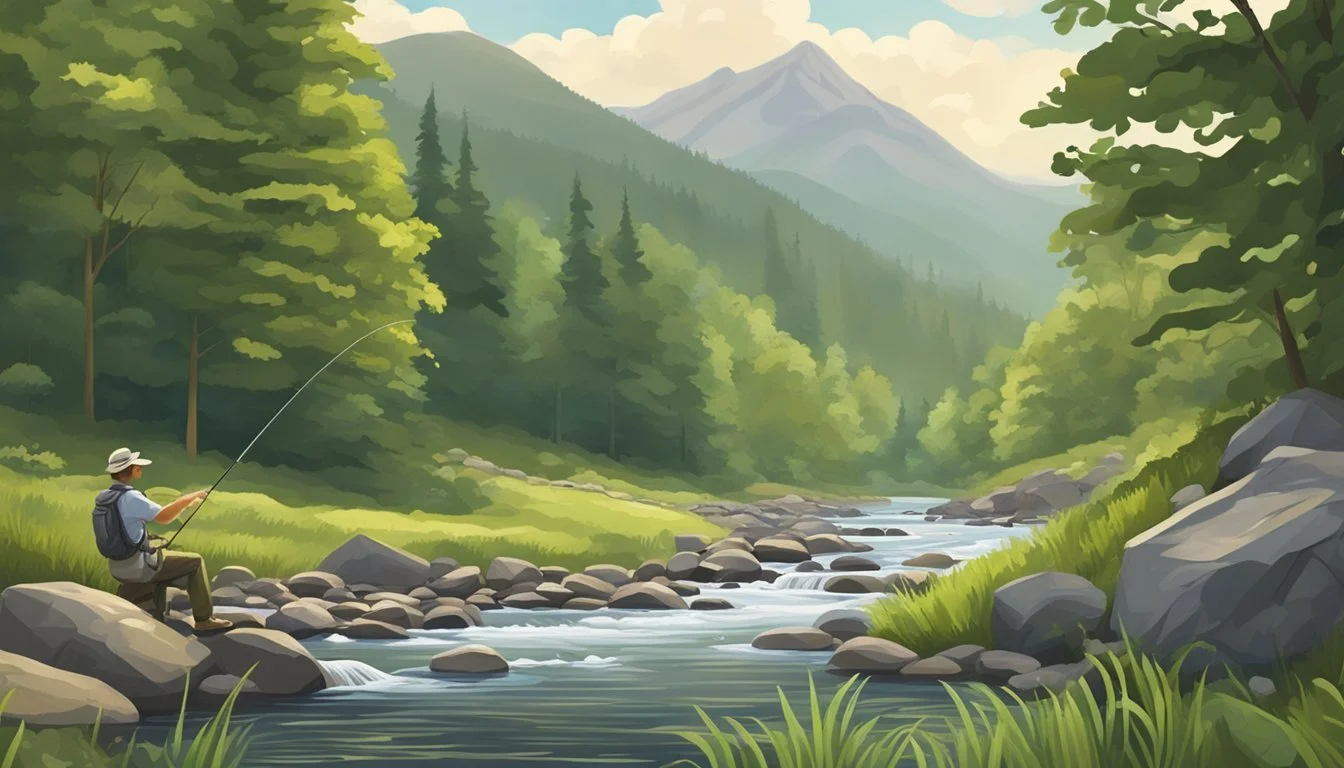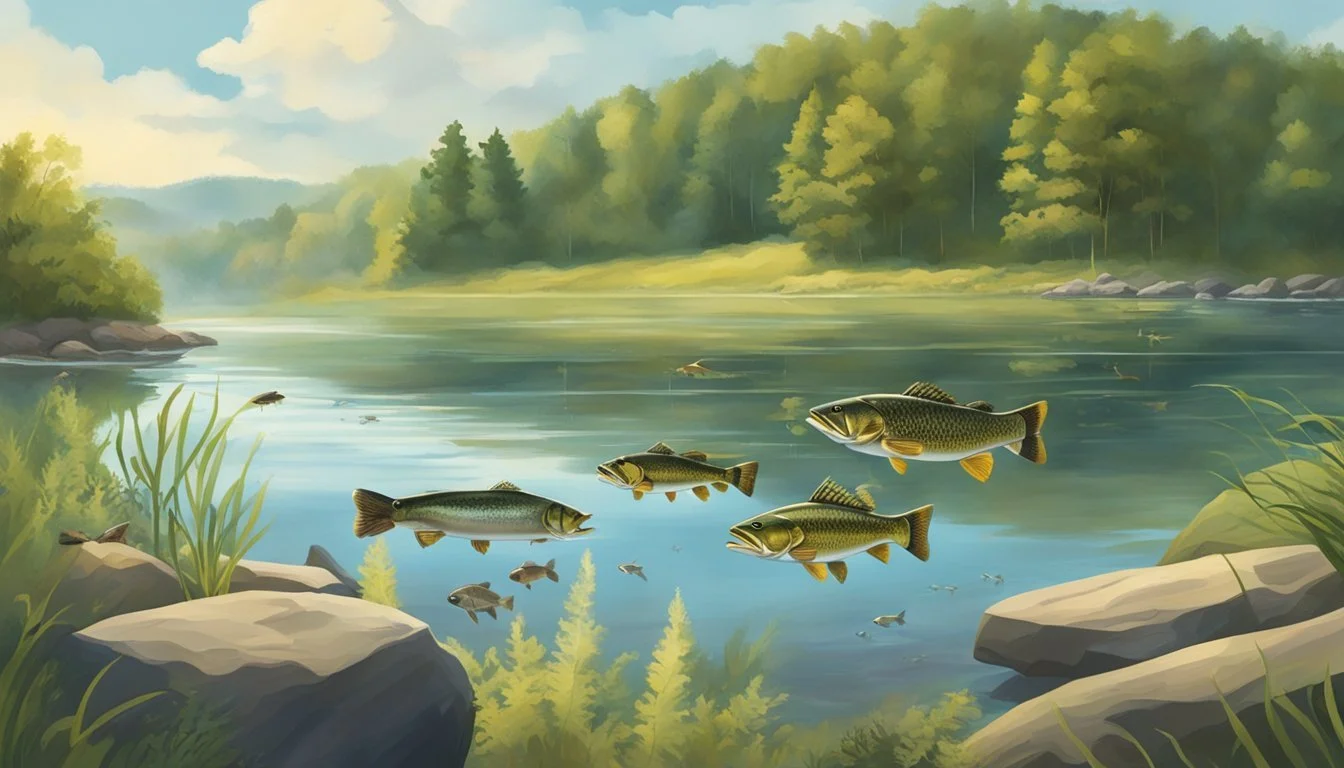Best Fish to Catch and Eat in West Virginia
A Delicious Adventure
West Virginia offers an abundance of fresh water bodies that provide excellent fishing experiences for anglers of all skill levels. These range from the expansive Summersville Lake, known for its variety of fish (What wine goes well with fish?) and recreational opportunities, to the state's numerous rivers and streams that are home to species prized for both sport and table fare. Fishing in West Virginia is not just about the catch, it's also about enjoying the state's stunning natural landscapes that provide a serene backdrop to any fishing excursion.
The state is populated with a variety of fish species that are both a joy to catch and delicious to eat. Among them, largemouth bass is celebrated for its fighting spirit and is often found in the state's lakes and ponds. Meanwhile, the mountain streams are stocked with trout, known for their delicate flavor, making autumn an ideal season for anglers looking to reel in a satisfying meal. Across the state, the waters are teeming with fish like smallmouth and spotted bass, catfish, and musky, each offering a unique fishing challenge and a rewarding culinary experience.
In preparing to fish in West Virginia, one must consider both the season and the fishing spot to optimize the chances of success. The Department of Natural Resources carefully stocks and manages waterways to ensure healthy populations of fish, providing guidance on the best times and locations for fishing. With proper planning and local insights, anglers can look forward to a memorable fishing trip that could culminate in a delicious, freshly-caught meal.
Getting Started in West Virginia Fishing
For those looking to embark on a fishing adventure in West Virginia, the initial steps involve understanding the state's fishing license requirements and becoming familiar with local regulations. These ensure a responsible and sustainable fishing experience.
Fishing Licenses and Regulations
All anglers in West Virginia must possess a valid fishing license to fish in state waters. West Virginia's Department of Natural Resources (WVDNR) oversees the licensing and regulations to maintain fish populations and habitat health. Licenses can be purchased online, which is the most convenient method, or at licensed agents throughout the state.
Key points about licenses and regulations:
Individuals under 15 years do not require a license.
Separate trout stamps are required when fishing for trout.
Licenses vary by type, such as resident, non-resident, and senior.
Regulations are strict to protect local ecosystems and species. These include:
Size and daily catch limits for different fish species.
Restrictions on the use of certain baits and tackle.
Specific rules for individual water bodies.
Remaining informed about these regulations is vital, as they can change annually.
West Virginia Fishing Resources
The WVDNR provides extensive resources to support anglers. These resources are invaluable for both novice and experienced fishers and encompass everything from species identification to the best fishing locations.
Annual fishing guide: Offers comprehensive information on species, seasons, and the environment.
Fish consumption advisories: Updated annually with recommendations on safe consumption limits.
The WVDNR website is the central hub for material on fishing opportunities, environmental conservation, and educational programs. They ensure that residents and visitors are equipped with the knowledge to make the most out of their fishing experiences in West Virginia.
Prime Fishing Locations in West Virginia
West Virginia offers an abundance of diverse fishing locations, from the serene rivers and streams in the valleys to the vast lakes and ponds amidst its scenic landscapes. Anglers seeking bountiful catches and enjoyable fishing experiences will find these spots well-endowed with both game and peace.
Rivers and Streams
Elk River: Known for its trout, the Elk River provides access to quality fishing spots. Excellent trout fishing can be found below the Webster Springs.
Cranberry River: Nestled in the Monongahela National Forest, this river is accessible by foot and is a haven for trout enthusiasts.
Cheat River: This river offers a variety of fish, including smallmouth bass and trout, and is surrounded by striking natural beauty near Seneca Rocks.
Potomac River: Particularly the South Branch of the Potomac River, offers diverse fishing opportunities, from smallmouth bass to catfish.
Shavers Fork: Located near Spruce Knob and Seneca Rocks, the Shavers Fork is celebrated for its trout population.
Lakes and Ponds
Summersville Lake: Renowned for its clear waters and cliffs, Summersville Lake also hosts a variety of fish, including bass and walleye.
Stonewall Jackson Lake: This lake is a popular destination with plenty of access points and a trove of fish like muskie and bass.
Tygart Lake: Offering plentiful walleye and bass, Tygart Lake's deep waters appeal to experienced and novice anglers alike.
Spruce Knob Lake: This lake rests in the highest point in West Virginia and is known for trout fishing in a tranquil, remote setting.
Bluestone River: Surrounded by picturesque cabins, Bluestone River in Southern West Virginia, flows into Bluestone Lake, a hotspot for catfish and bass.
Fish Species and Bait Selectio
Anglers in West Virginia can anticipate productive outings if they match the right bait to the target species. Well-chosen baits increase the likelihood of a successful catch, whether the preference is for trout, bass, or a variety of other species.
Trout
Rainbow Trout and Brown Trout thrive in West Virginia's cooler waters. For Rainbow Trout, anglers often employ flies or small spinners. Effective flies include nymphs or streamers that mimic the trout's natural prey. PowerBait and worms are also popular choices, especially in stocked waters. In contrast, Brown Trout, known for being more elusive, respond well to a more subtle approach using smaller lures and live bait like minnows.
For Golden Rainbow Trout, a West Virginia specialty, brightly colored baits that stand out in the water, such as corn or colored marshmallows, (how long do marshmallows last?) can be highly effective. When fishing in catch-and-release areas, artificial lures are the norm, with single-hooked flies and lures being the most suitable.
Bass
Largemouth Bass favor warm water habitats and typically respond well to a variety of lures and live baits depending on the time of year. In spring and fall, plastic worms and crankbaits in colors resembling the local prey work well. During the summer months, topwater lures can provoke an exciting surface strike.
Smallmouth Bass, found in both rivers and lakes, are attracted to different lures such as spinnerbaits and jigs. Smallmouth enthusiasts often use crayfish patterns as they reflect the bass's natural diet. In clearer waters, natural colors such as brown and green are more effective, while brighter colors can be more attractive in murkier waters.
Catfish and Other Species
Channel Catfish often fall for baits with strong odors. Stink baits, chicken liver, and nightcrawlers are among the top choices. Anglers targeting catfish also find success with cut baits like shad or herring.
Other species such as Crappie, Bluegill, and Walleye enjoy a wide bait palette. Small jigs and minnows are the go-to options for Crappie, which are particularly active in the early morning or evening hours. Bluegill, a type of panfish, are less particular and can be caught with simple baits such as worms or small pieces of bread. Walleye, which are more active at night, are often enticed by live baits like minnows or leeches, or by artificial lures that mimic small fish.
For each species, it's essential to adjust bait size and color to the prevalent conditions and the fish's feeding habits. Lively live baits often yield the best results, especially when fishing for species that rely on their sense of smell and movement to hunt.
Fishing Techniques and Equipment
Mastering the correct fishing techniques and using the right fishing equipment are fundamental to successful angling in West Virginia, where diverse freshwater environments present a myriad of opportunities.
Freshwater Fishing Methods
For anglers targeting West Virginia's popular game species—like smallmouth bass and walleye in the state's streams and rivers—light spinning rods and small crankbaits are typically effective. It is recommended to use a light line, weighing around 4-6 pounds. When pursuing walleyes, especially during summer months, they may be found at depths between 25 and 50 feet. Jigs are a common lure choice for these deeper waters.
In the South Branch of the Potomac River, fishing techniques can vary greatly depending on the target species. Anglers often use boats or rafts to access prime fishing spots and may rely on a mixture of lures and live bait to attract their quarry.
Fly Fishing Focus
Fly fishing in West Virginia offers a unique experience, particularly in the Monongahela National Forest and its pristine trout streams, like the acclaimed Seneca Creek. Anglers are advised to invest in a quality fly rod, which allows for precise casting techniques in these often-challenging waters. When aiming for trout, securing a trout stamp is necessary along with your fishing license.
Fly-fishing enthusiasts typically utilize a variety of nymphs, which are designed to imitate immature stages of aquatic insects, in the belief that these lures are irresistible to the native brook trout. These fish are found in abundance in the cooler, shaded waters of West Virginia's forests.
Anglers must be mindful of the fishing environment, using stealth and patience as they navigate the crystal-clear pools and riffles. The tranquility and complexity of fly-fishing in West Virginia require not only skill but an appreciation for the natural beauty and the subtle interplay between angler, fish, and habitat.
Conservation and Ethics
In West Virginia, preserving the integrity of natural resources, such as fish populations and their habitats, is crucial. Ethical practices by anglers and conservation efforts by the West Virginia Division of Natural Resources (DNR) support the health of aquatic ecosystems.
Sustainable Fishing Practices
One cornerstone of ethical angling in West Virginia is the concept of sustainable fishing practices. Stocking programs are managed carefully to balance the needs of anglers with the preservation of natural fish populations. Fish stocking, when done ethically, replenishes species without disrupting the existing aquatic community. Anglers are encouraged to follow catch-and-release guidelines, particularly for species that are under conservation management or are not safe to consume due to contaminants.
Best Practices for Catch-and-Release:
Use barbless hooks to minimize harm to fish.
Handle fish as little as possible and with wet hands to prevent removal of their protective slime.
Release fish back into the water promptly.
Habitat Protection
The protection of West Virginia's wilderness, including forests and water bodies, is vital to conserving its rich biodiversity. The West Virginia Division of Natural Resources actively works to maintain and restore habitats to ensure they can support healthy fish populations. Habitat protection measures also benefit the broader ecosystem, including other wildlife and plant species.
Key Habitat Protection Strategies:
Eradication of invasive species that threaten native fish.
Restoration of streams and shoreline vegetation to prevent erosion.
Pollution control to prevent the degradation of water quality.
These careful measures ensure that West Virginia's natural resources can continue to be enjoyed for generations to come.
Planning Your West Virginia Fishing Trip
When planning a fishing trip to West Virginia, anglers should consider the seasonal weather patterns and explore the range of accommodations and amenities available near prime fishing spots.
Seasonal Considerations
Summer in West Virginia offers warm, longer days ideal for fishing. High-altitude, mountainous areas provide a respite from the heat, making locations like the North Fork of the South Branch Potomac River or Elk Springs prime spots for a fishing adventure. Trout fishing is regulated and one should consult the West Virginia Division of Natural Resources for specific regulations that apply, including size limits and catch-and-release areas. Access points along rivers can vary with both public and private options; always seek permission before fishing on private land.
Key Summer Fishing Spots:
South Branch Potomac River
North Fork of the South Branch Potomac River
West Virginia trout streams such as those near Parsons
Accommodations and Amenities
Anglers should look for lodging that caters to their needs, from rustic campsites to comfortable lodges. Elk Springs offers a blend of outdoor adventure with the comfort of nearby amenities. Access to fishing spots can be remote in the more mountainous regions, so being prepared with the right gear is essential. Some accommodations may offer guided fishing trips, making them a good choice for those unfamiliar with the region's Appalachia terrain. Always check for the availability of amenities and proximity to the desired fishing locations.
Accommodation Tips:
Seek lodging with easy access to fishing spots.
Consider accommodations that provide fishing guides.
In summary, a successful fishing trip in West Virginia involves understanding the seasonal patterns, adhering to state fishing regulations, and selecting accommodations that enhance the overall experience.
Local Angling Culture and Community
West Virginia's angling community is woven into the state's fabric, placing a clear emphasis on inclusive participation for anglers of varying experience levels and a commitment to fostering a love for fishing through public events and educational resources.
Events and Competitions
Throughout the year, West Virginia hosts numerous fishing events and competitions that cater to anglers of all skill levels. Grant County, for instance, becomes a hub for competitive fishing, attracting both seasoned and novice anglers eager to test their abilities and showcase their catches. Events like trout stockings and catfish tournaments are publicized through platforms like wvfish.com, which serve as comprehensive resources for event schedules and fishing reports from across the state. These competitions not only add an element of excitement to the sport but also strengthen the community bond among fishermen.
Educational Opportunities
The state offers a variety of educational opportunities aimed at increasing knowledge and skill among its anglers. Through workshops and programs, both the youth and adult members of the angling community are encouraged to learn from experienced fishermen. Public initiatives and resources provide guidance on topics ranging from sustainable fishing practices to techniques for successfully catching local species. These educational efforts contribute to a well-informed public that respects the natural environment and engages responsibly in the sport of fishing.
Additional Considerations for West Virginia Anglers
When fishing in West Virginia, anglers should be mindful of safety protocols and take advantage of local expertise to enhance their experience.
Safety Tips
West Virginia's forests and bodies of water offer a rich fishing environment, but they also pose certain risks. Anglers are advised to follow these safety tips:
Wear a life jacket: Always when fishing from a boat or near swift currents.
Be weather-wise: Check the forecast and prepare for sudden weather changes.
It's essential to keep in mind the recent fish consumption advisories, such as the specific limitation of "one meal a week" for certain fish like largemouth bass and white crappie from areas like Upper Mud Reservoir, due to contaminants like selenium.
Local Support and Guides
Anglers looking for a productive fishing trip in West Virginia should consider:
Hiring local guides who can provide insights into the best fishing spots and techniques specific to the region. Guides often know the waterways intimately and can ensure a safer and more successful outing.
Staying in local cabins which can serve as a convenient base for exploring the various fishing locations. They offer the necessary amenities for comfort and are often situated close to prime fishing areas.
By adhering to safety guidelines and leveraging local knowledge and accommodation options, anglers can thoroughly enjoy the fishing opportunities that West Virginia has to offer.







